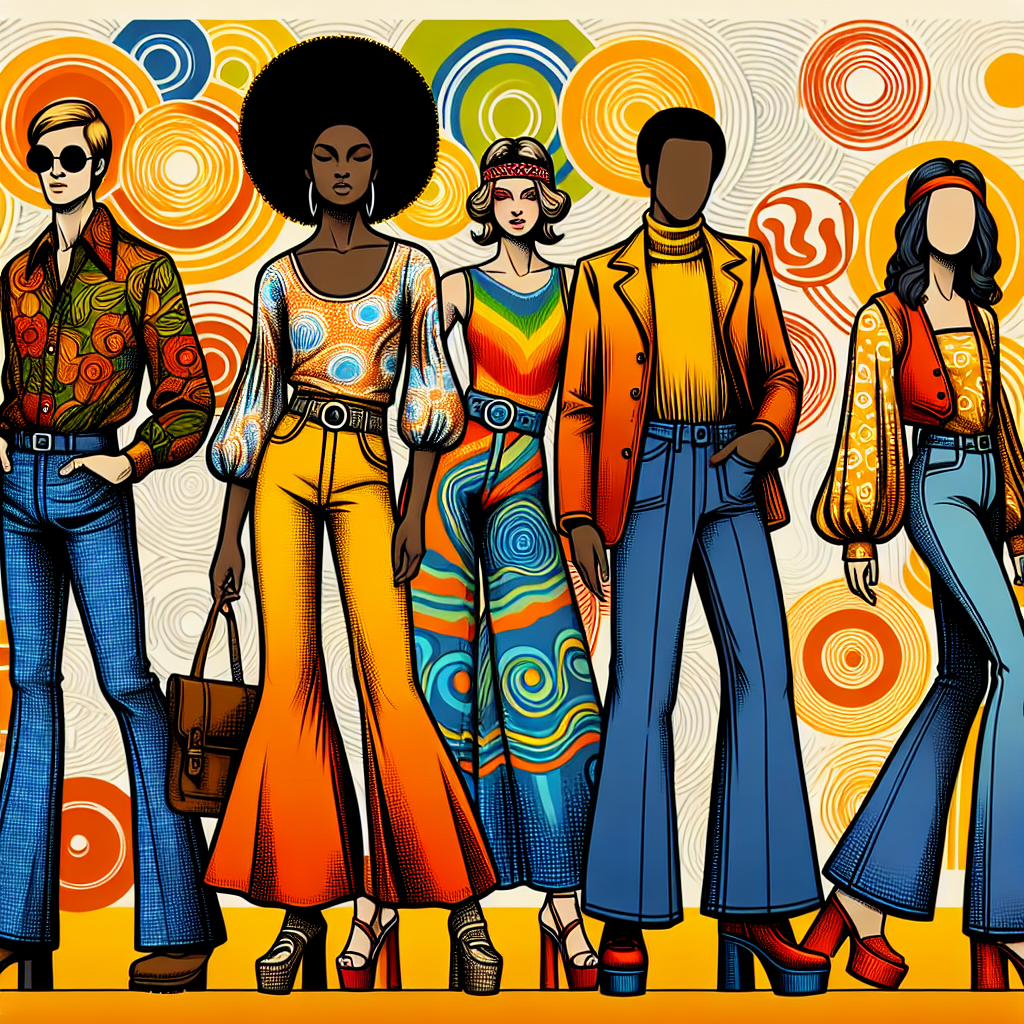Introduction
The 1970s fashion scene is an enduring emblem of creativity, freedom, and unique self-expression. One of the most iconic tides within this era was Groovy ’70s Fashion Trends, heavily inspired by the television show "Good Times," which premiered in 1974. These retro styles remain influential and cherished, transcending their original period and leaving a lasting legacy on the fashion industry. Groovy ’70s fashion trends symbolize more than just a period of sartorial flair; they reflect an age of significant social change, cultural amalgamation, and a widespread quest for identity and authenticity.
Significance in Fashion History
The ’70s were a transformative decade characterized by a rich fusion of eclectic styles. The era welcomed a departure from the rigid, polished looks of earlier decades, moving towards more relaxed and individualistic expressions. The influence of "Good Times" cannot be understated; the show, set in a Chicago housing project, highlighted African American culture and style, becoming a beacon of representation and an influential trendsetter. The fashions showcased in "Good Times" mirrored the socio-political climate, celebrating African American heritage and reflecting broader movements towards civil rights, gender equality, and anti-establishment ideals.
Main Themes and Styles
The groovy ’70s fashion trends were diverse but interlinked by common themes of individuality, freedom, and bold self-expression. Key styles included:
-
Disco Fashion: Characterized by shimmering fabrics, bell-bottoms, platform shoes, and bright, bold colors, disco fashion was about free-spirited fun and extravagant glamour. Often associated with music culture, these styles became synonymous with nightlife and dance.
-
Bohemian Influence: Bohemian styles celebrated the countercultural ethos of the ’60s, emphasizing ethnic prints, flowing maxi dresses, peasant blouses, and an overall relaxed silhouette. This style promoted a connection to nature and a rejection of mainstream conventions.
-
Urban Chic: Heavily influenced by African American communities, urban chic included Afrocentric prints, tailored suits, and statement accessories. Shows like "Good Times" brought these styles to the forefront, celebrating black pride and cultural heritage through fashion.
- Sportswear and Casual Attire: Reflecting an era of relaxed attitudes, sportswear became increasingly popular. Track suits, sneakers, and casual tees highlighted the appeal of comfort without sacrificing style.
Cultural Influences and Examples
Groovy ’70s fashion trends were profoundly influenced by the cultural waves of the time—civil rights movements, women’s liberation, anti-war protests, and the rise of disco and funk music. These movements not only fostered an environment of change but also became entwined with fashion as a form of non-verbal communication and societal commentary.
-
Designers and Collections: Influential designers like Halston, Yves Saint Laurent, and Diane von Furstenberg played pivotal roles in defining the decade’s style. Halston’s minimalistic yet luxurious pieces, YSL’s incorporation of androgyny and ethnic motifs, and von Furstenberg’s iconic wrap dress all contributed to the era’s diverse aesthetic palette.
-
"Good Times" Costume Design: The show’s costume design, helmed by Flora Berkofsky, displayed relatable yet trendsetting apparel. The character of Thelma Evans, for example, frequently showcased bold patterns, layered looks, and Afro-centric styles, cementing the show’s influence on mainstream fashion.
- Disco Culture: Clubs like Studio 54 became the epicenter of disco fashion, with attendees donning sequin dresses, jumpsuits, and flamboyant accessories. Designers such as Bob Mackie embodied this ethos, creating costumes that were as much about making a statement as they were about celebrating life and exuberance.
Reflecting Cultural and Social Contexts
Groovy ’70s fashion trends didn’t evolve in a vacuum; they were the sartorial reflection of significant historical narratives.
-
Civil Rights Movement: The fashion of this era was a visual assertion of African American culture and identity. The widespread adoption of Afro hairstyles and dashikis among African Americans and the broader public symbolized a reclaiming of heritage and pride.
-
Women’s Liberation: The rise of androgynous fashion and power dressing highlighted the shifting dynamics in gender roles. Women were increasingly entering the workforce and demanding attire that symbolized empowerment and authority, leading to the popularity of pantsuits and unisex fashion.
- Social Liberation: The growing acceptance of bohemian and eclectic styles mirrored the social liberation movements, facilitating a culture that embraced diversity, personal freedom, and anti-establishment sentiments.
Lasting Legacy and Influence
The legacy of groovy ’70s fashion trends is undeniably strong. Modern designers often draw inspiration from the era, evident in the ubiquitous presence of bohemian prints, wide-leg pants, and retro accessories on contemporary runways. Vintage ’70s pieces are highly sought after, and fashion cycles continue to reincorporate elements of this transformative decade.
Moreover, the socio-cultural aspects of ’70s fashion have spilled into popular culture. The representation seen in "Good Times" paved the way for more diverse and inclusive narratives in media today, while the spirit of individualism and progressive thought from the ’70s continues to resonate.
Reflective Questions
As we look back on groovy ’70s fashion trends, several questions emerge:
- How do modern socio-political movements shape contemporary fashion, much like the civil rights movement influenced ’70s styles?
- In what ways can fashion today continue to challenge norms and promote inclusivity, echoing the transformative spirit of the ’70s?
- How can we ensure the lasting impact of historically significant fashion trends is preserved and celebrated?
Conclusion
Reflecting on groovy ’70s fashion trends inspired by "Good Times" offers a rich tapestry of insights into the ways fashion intertwines with cultural, social, and historical contexts. The decade’s styles continue to influence and inspire, underscoring the power of fashion as both a personal expression and a societal barometer. By examining the intricate connections between fashion and broader societal shifts, we gain a deeper appreciation for the lasting impact of the ’70s on today’s fashion narratives.
Got more questions? Our personalized Fashion Explorer AI assistant is here to help. Click here to start a conversation!
[Advertisement]
Wondering how fashion reflects deeper values? Discover how ANY trend or style relates to positive biblical principles with Fashion and Scripture GPT from BGodInspired.com. Click here to see fashion in a new light!
[Advertisement]

